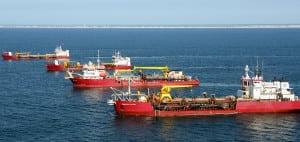Latest News
In the “Battle on the High Seas. New Maritime Broadband Competition” panel, key satellite players both on the operator and ground segment side looked at the particular dynamics of what is considered a key growth market for satellite. A number of topics were covered such as crew welfare, disruptive technologies and what the industry can do better to serve a market that is potentially capital constrained.
Brian Pemberton, vice president and general manager for maritime and aviation at Iridium Communications, said there was plenty of opportunity for all players. “I don’t know if someone has to lose. I think value wins,” he said. “It is not just about delivering the communications, it is the delivering of applications, so they can start to make money. Those who can help with the delivery of applications will be the winners.”
However, Pemberton is cautious on the rate of change. “There are certain customers that are very content with their business operations and model today. There is interest in our new services. There is a segment of the market that is starting to look for an alternative,” she said.
Crew welfare was also a big talking point on the panel. This has been an ongoing issue in the industry as crew retention has become more of an important issue. “As far as crew welfare is concerned, I would say they are underserved. They would probably require a better experience, but much of that gets back to their desire to pay for it. There are some shipping operators that will subsidize this for morale,” Pemberton said. “Understanding crew behavior and how satellite supports that is very tricky. Some crew come from parts of the world, which are used to connectivity. Yet, there are other crew from other parts of the world, where it is not a necessity. The ability and willingness to pay are definitely challenges.”
Drew Brandy, senior vice president of market strategy at Inmarsat Maritime, pointed out to the audience that less than 30 percent of crew have access to the Internet, calling it a “a very low performance.” He then added this was not going to change until the shipping operators decide this is what they need to do. He did think crew welfare as an issue would become more critical going forward. “You will see crew demanding this more and systems will be able to support this much better going forward. There is an expectation that crew want to have access. We are seeing it with some of the larger ship owners. They are providing media and entertainment services [to their crew],” he added.
Chris Insall, senior principal product manager of maritime services at Intelsat, added that, according to some of Intelsat’s research, 70 percent of the respondents said Internet access was a key determinant on whether they take their next job. “People are used to a genuine broadband service. For the first time, we have an official mandate to provide Internet to crew. There are a lot of dynamics in this area. There are strong drivers in crew going forward,” he said.
One of the key challenges facing companies here is to bring a better experience to ships, both in terms of operations and in terms of user experience. Intelsat, with its EpicNG satellites is also targeting the maritime sector. Insall said the demand for services meant this was an exciting time for the operator. He talked about Intelsat working with Kymeta in developing new flat-panel antenna systems in maritime, which he hailed as a key development for the company. While high-end markets, such as the super yacht market, could be one of the early beneficiaries of this technology, it could ultimately filter down into other sectors of the maritime market. “The opportunity for lighter and lower-cost systems are of benefit to more than one vertical,” said Insall.
Matthew Broida, vice president of strategy at Harris CapRock, another key player in maritime, believes there is a strong latent demand for bandwidth, but ultimately new business models will start to emerge in the maritime sector. He said the pace of change is as fast as it has ever been recently.
“You have to consider new business models. I think across the different sectors, there are opportunities to try new models. Things are moving so fast. With all the changes going on, they [the customer] need help. They want you to serve this for them, whether LEO/MEO/GEO. It is important that when you look at different segments within this space such as energy, cruise, maritime, there is not one model that works for each segment. What we are seeing is that the value chain is disruptive. You have to evolve with how the value chain is moving. It will force you to place some bets,” he said.
Steve Good, vice president of marketing at Comtech EF Data, represented the ground segment side on the panel and highlighted the increasing issue of cybersecurity going forward. “I don’t think the industry is aware enough of the cybersecurity issues. I think the subject of cybersecurity will become bigger [in maritime]. From a security perspective, we are seeing more video being sent back and forth. It will create challenges,” he added.
Get the latest Via Satellite news!
Subscribe Now